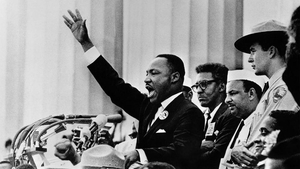Fifty years ago (August 28), Dr. Martin Luther King delivered his legacy “I have a dream” speech. Events are planned in Washington at the Lincoln Memorial, and elsewhere, commemorating this landmark address. Speakers are expected to highlight Dr. King’s philosophy for promoting change, how the civil rights movement and its accomplishments defined modern America, and the work that remains to be done. President Barack Obama will speak, honoring the work of Dr. King.
Five years ago, the Democratic Party chose as its nominee, Barack Obama, who went on to become the first African-American president. Hope and change were in the air. While much of the optimism associated with Obama’s victory has been tempered through the rigors of governing, it was no small achievement on the part of the American electorate. Re-electing him in November 2012 consolidated this historic accomplishment.
 Surely, Dr. King would consider the Obama election very much a part of the dream articulated 50 years ago but it is more important to recall how the famed civil rights leader led his quest for equality and justice. Above all, he was an inspiration to his followers by his example, and he did it through the power of his words and his actions. In “Letters from a Birmingham Jail,” he stated that ‘’injustice anywhere is a threat to justice everywhere.’’ In “I have a dream,” Dr. King expressed the hope that all should be judged “by the content of their character and not the color of their skin.” Powerful words indeed, and they remain as relevant today.
Surely, Dr. King would consider the Obama election very much a part of the dream articulated 50 years ago but it is more important to recall how the famed civil rights leader led his quest for equality and justice. Above all, he was an inspiration to his followers by his example, and he did it through the power of his words and his actions. In “Letters from a Birmingham Jail,” he stated that ‘’injustice anywhere is a threat to justice everywhere.’’ In “I have a dream,” Dr. King expressed the hope that all should be judged “by the content of their character and not the color of their skin.” Powerful words indeed, and they remain as relevant today.
In addition to words, Dr. King was a man of action—a man of peaceful action. Inspired by the example of Mahatma Gandhi, King’s chosen tactics included pacific resistance such as boycotts, marches and sit-ins. To those in authority who used water hoses and police dogs to break up peaceful demonstrations, King and his followers responded with acts of nonviolence—just as Rosa Parks refused in 1955 to sit in the back of a bus. Dr. King resisted segregation and prejudice with a firm confidence in the righteousness of his beliefs.
Since the passage of civil rights legislation in 1965, there has been quantitative and qualitative progress. Yet today, unemployment remains higher among African-American communities, gun violence is at epidemic proportions, and African Americans populate prison facilities in proportionately higher numbers.
Recent events surrounding the Zimmerman trial and the killing of Trayvon Martin once again illustrate that there is much to do to reach Dr. King’s dream. New York City’s “Stop and Frisk” policy, which in practice affects a much higher proportion of African Americans, is currently before the courts regarding its constitutionality. Last spring the Supreme Court overturned certain provisions of the 1965 Voting Rights Act and it seems to have emboldened some states (like North Carolina) to introduce more restrictive voting procedures.
It is likely that Dr. King, if he were alive today, would assert that his dream is not yet fulfilled. Yet, by virtue of his work, his vision and his legacy, it is accurate to say that Martin Luther King is the founding father of modern America, one that is more diverse, ever challenging and rapidly changing. He has become a model for courage and idealism beyond his moment in history and that is the mark of a founding father.
On the night of his assassination on April 4, 1968, then presidential candidate Senator Robert F. Kennedy best summarized Dr. King’s legacy: “Martin Luther King dedicated his life to love and to justice between fellow human beings, and he died because of that effort.”
Tragically, we lost Senator Kennedy two months later, but Dr. King’s dream for a more just, more compassionate and more equal America is as important as ever. And yes, the dream still lives on.
John Parisella is a the former Quebec delegate general in New York and currently an invited professor at University of Montreal’s International Relations Center. His Twitter account is ?@JohnParisella.

























Commentaires
Veuillez vous connecter pour poster des commentaires.